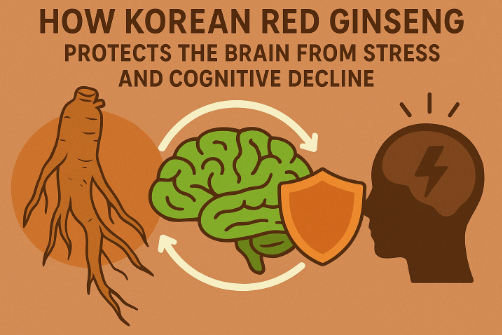Cognitive decline and mental fatigue are among the most pressing health issues in modern society. Aging, chronic stress, and environmental factors such as poor sleep and oxidative exposure can accelerate the loss of neuronal integrity and cognitive performance. Scientists are increasingly exploring natural neuroprotective agents that can support brain resilience and slow the degenerative process.
One of the most studied herbal candidates in this area is Korean Red Ginseng (Panax ginseng Meyer), a traditional medicinal root revered for centuries in East Asia and now recognized globally for its adaptogenic and neuroprotective properties.
The Biology of Cognitive Decline and Stress Response
The human brain is highly sensitive to stress. Chronic exposure to psychological or physiological stressors activates the hypothalamic–pituitary–adrenal (HPA) axis, leading to elevated cortisol levels. Persistent cortisol elevation contributes to neuronal damage, reduced hippocampal volume, and impaired memory consolidation.
Moreover, oxidative stress — caused by an imbalance between free radicals and antioxidant defenses — further accelerates neuroinflammation and synaptic dysfunction, both of which are key hallmarks of neurodegenerative diseases such as Alzheimer’s and Parkinson’s disease.
In this context, adaptogenic herbs like Korean Red Ginseng have attracted attention for their ability to modulate the HPA axis, enhance antioxidant defenses, and promote cellular resilience in the brain.
Ginsenosides: The Neuroprotective Compounds in Korean Red Ginseng
The pharmacological activity of Korean Red Ginseng largely stems from its unique class of triterpenoid saponins known as ginsenosides. More than 40 ginsenosides have been identified, with Rg1, Rb1, Rg3, Rf, and Re among the most potent for neural protection.
- Ginsenoside Rg1 has been shown to enhance neuronal plasticity and increase the expression of brain-derived neurotrophic factor (BDNF) — a protein essential for learning and memory.
- Ginsenoside Rb1 acts as a neuroprotectant by reducing oxidative stress, suppressing inflammation, and preventing apoptosis (cell death) in cortical neurons.
- Ginsenoside Rg3, a compound formed during the steaming process of red ginseng, demonstrates anti-inflammatory and anti-fatigue effects through the inhibition of microglial activation and reactive oxygen species (ROS).
Collectively, these compounds regulate multiple signaling pathways — including PI3K/Akt, MAPK, and Nrf2/ARE — that play central roles in protecting neurons from stress-induced damage and maintaining synaptic function.
How Korean Red Ginseng Reduces Stress and Enhances Mental Resilience
Adaptogens like Korean Red Ginseng are defined by their ability to normalize the body’s physiological response to stress. Unlike stimulants, ginseng does not over-activate the nervous system; instead, it helps restore homeostasis.
In a double-blind, placebo-controlled trial published in Phytotherapy Research (2013), participants who consumed 200–400 mg of Korean Red Ginseng extract daily for eight weeks reported significant improvements in mental calmness and reduced fatigue compared with the placebo group.
Biochemical markers also showed reduced cortisol levels and improved antioxidant enzyme activity (superoxide dismutase and catalase).
Another clinical study in Human Psychopharmacology (2010) observed that middle-aged adults taking standardized Korean Red Ginseng demonstrated better working memory, mental clarity, and reaction time during cognitive tasks, indicating enhanced resilience under psychological stress.
Protection Against Cognitive Decline and Neurodegenerative Diseases
One of the most promising aspects of Korean Red Ginseng is its potential to delay or mitigate age-related cognitive decline.
Experimental studies on aging mice have shown that ginsenoside Rg1 significantly improves spatial learning and synaptic density in the hippocampus — the brain’s center for memory processing.
In human studies, supplementation with Korean Red Ginseng has been associated with improved mini-mental state examination (MMSE) scores among elderly participants with mild cognitive impairment (MCI).
A randomized, placebo-controlled trial published in the Journal of Ginseng Research (2018) found that patients who received 3 grams of red ginseng daily for 12 weeks exhibited measurable improvements in attention, recall, and language fluency compared to baseline measurements.
On the molecular level, ginsenosides help reduce the accumulation of beta-amyloid plaques and tau protein phosphorylation — pathological processes implicated in Alzheimer’s disease.
They also inhibit neuroinflammatory cytokines like TNF-α and IL-6, protecting neurons from chronic inflammatory damage.
Why Korean Red Ginseng Outperforms Other Types
While several types of ginseng exist, Korean Red Ginseng is distinct in both composition and potency.
The steaming and aging process converts raw white ginseng into red ginseng, enhancing the formation of unique compounds such as Rg3, Rg5, and Rh2, which are absent or present only in trace amounts in other varieties.
These compounds not only increase antioxidant activity but also improve blood–brain barrier permeability, allowing neuroprotective agents to reach target tissues more effectively.
Comparative analyses show that Korean Red Ginseng contains higher levels of phenolic compounds and polyacetylenes, contributing to stronger anti-inflammatory and neuroprotective effects than American or Chinese ginseng.
Furthermore, long-term use of standardized Korean Red Ginseng extracts has demonstrated a favorable safety profile, with no significant adverse effects reported in multiple human trials up to 24 weeks.
Incorporating Korean Red Ginseng into a Brain-Healthy Lifestyle
For optimal brain protection, Korean Red Ginseng can be integrated into a holistic lifestyle that includes proper nutrition, regular physical activity, and cognitive stimulation.
Clinical studies generally recommend doses between 200 mg and 1,000 mg per day of standardized extract, taken for at least 8–12 weeks to observe measurable effects.
It can be consumed in capsule, tea, or liquid extract form. Combining ginseng with omega-3 fatty acids, B-complex vitamins, and magnesium may provide synergistic benefits for neuronal health.
However, individuals taking antihypertensive or antidiabetic medications should consult healthcare professionals before use, as ginseng can influence metabolic pathways.
Conclusion: Nature’s Cognitive Shield
Korean Red Ginseng represents one of the most comprehensively studied natural adaptogens with profound implications for brain health.
Its multi-target actions — from balancing the HPA axis to stimulating neurotrophic factors and reducing oxidative stress — make it a unique candidate for supporting mental clarity, emotional balance, and long-term cognitive longevity.
As modern life continues to impose relentless mental demands, incorporating evidence-based natural strategies like Korean Red Ginseng may offer a safe and scientifically grounded way to preserve cognitive vitality throughout aging.
🇰🇷 Premium Korean Ginseng Online Shop







